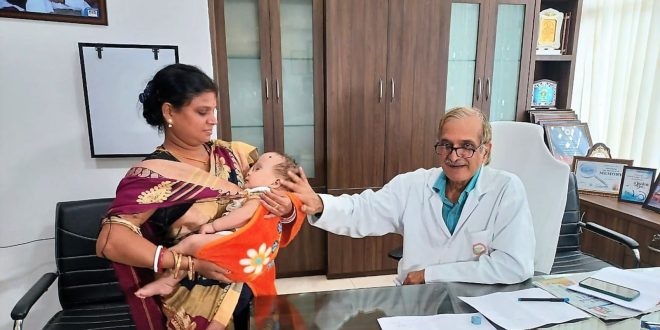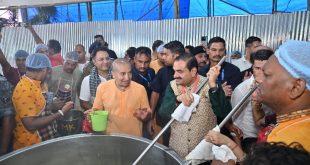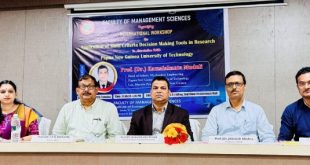Bhubaneswar: Neurosurgeons at the Institute of Medical Sciences and SUM Hospital here have successfully operated on a 8-month-old baby boy who had been born with a huge meningomyelocele, a protrusion in the back caused by a congenital defect, which is believed to be the biggest recorded anywhere in the world.
“The baby came to us with the large protrusion which is known as giant meningomyelocele measuring about 4300 sq cm in volume. It is the largest I have seen,” Prof. (Dr.) Ashok Kumar Mahapatra, eminent neurosurgeon under whose supervision the surgery was done, said.
The baby’s swelling was small at birth but several hospitals the family visited said it could not be treated which resulted in delay allowing it to grow bigger, Prof. (Dr.) Mahapatra, who is Principal Advisor (Health Sciences) to Siksha ‘O’ Anusandhan Deemed to be University, said.
Explaining the medical problem, Prof. (Dr.) Mahapatra, said one month after pregnancy, the placenta grows to about an inch and is known as neural tube. It grows to become the spinal cord, but if it ruptures it leaks fluid.
The fluid containing sac with neural tissues protrude from the back forming such a growth, Prof. (Dr.) Mahapatra, who has done around 4000 such surgeries, said describing this case as a rare one.
“We had come across a case of meningomyelocele at AIIMS, New Delh in 2015 which measured around 2300 sq cm in volume. But it needs further study as we had not come across such a large protrusion in published cases,” he said.
The surgery, which took about three to four hours, was done more than three weeks ago and the baby was out of danger now. But the medical condition had caused the baby to get paralysed waist below, he said.
Prof. (Dr.) Soubhagya Panigrahi, Professor and Head of Department of Neurosurgery in the hospital, said such surgeries were done routinely at IMS and SUM Hospital. This case was done under the state government’s Biju Swasthya Kalyan Yojana (BSKY), he said.
Prof. (Dr.) Ram Chandra Deo, Neurosurgeon in the same department, said there was need for public awareness about this medical condition. As most healthcare facilities were reluctant to do the surgery as there was possibility of much blood loss, the problem often got neglected, he said.
 Update Odisha-Latest Odisha News I Breaking News Get latest news on Odisha, Govt. Jobs, OSSC, OPSC, Entertainment, Crime, Sports, and Education
Update Odisha-Latest Odisha News I Breaking News Get latest news on Odisha, Govt. Jobs, OSSC, OPSC, Entertainment, Crime, Sports, and Education



